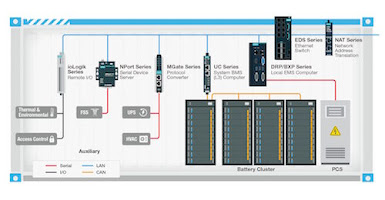 |
| BESS communication systems must address extreme climate challenges, meet strict power auxiliary system demands, and enhance cybersecurity |
Challenge of Extreme Climate Conditions.
Extreme weather events are happening more frequently now than in the past, according to the Intergovernmental Panel on Climate Change (IPCC). Heatwaves, for instance, are 2.8 times more likely to occur than in the previous decade. Such circumstances impose enormous strain on electronic communication products, as well as on human life and agriculture. Dramatic temperature fluctuations, sandstorms, and lightning strikes may cause communication equipment malfunctions, subsequently affecting the operation of BESS. Since these storage systems are often in remote areas, selecting highly durable, industrial-grade communication equipment that can withstand extreme environments is crucial.
Demand for Real-time Responses.
As power grids become more advanced and require stricter management, BESS's quick charging and discharging characteristics are essential in balancing supply with demand. Consider Britain's national grid, where the necessary power auxiliary reaction time has been decreased from a starting need of 10 seconds to just 500 milliseconds. Some countries hope that the newest storage batteries can achieve response times at the 100-millisecond level. This implies that future communication systems must have faster data transfer speeds, higher bandwidth, and more reliable network redundancy designs.
Recent Network Security Issues.
Cyberattacks on energy and power systems are increasing, leading stakeholders to pay more attention to data security. Many countries now regard the power grid system as a national-level critical infrastructure and are setting higher cybersecurity standards. NERC's "Security Integration Strategy" and the EU's "Network and Information Security Directive 2.0" are two examples of heightened security strategies. Thus, future BESS communication designs must feature improved cybersecurity to counter increasingly severe online threats.
To sum up, energy transition progress notwithstanding, BESSs face multiple challenges. In this journey, a stable communication system is key, one that addresses climate change, meets strict power auxiliary system demands, and enhances cybersecurity. Experience tells us that the selection and design of communication systems should consider all these factors to ensure stable operations. Moving forward, BESS providers must continuously monitor these crucial areas, consistently optimizing the performance and reliability of their communication systems.
As a pioneer in networks for renewable energy, Moxa recognizes the vast potential of BESS and has developed reliable, versatile, and secure products to take this battery energy storage technology to the next level. These include Moxa Arm and x86 computers, MGate protocol gateways, NPort serial device servers for environmental control, EDR routers with advanced cybersecurity, ioLogik Ethernet remote I/O, and a large portfolio of managed and unmanaged industrial Ethernet switches for superior connectivity and redundancy.

















No comments:
Post a Comment